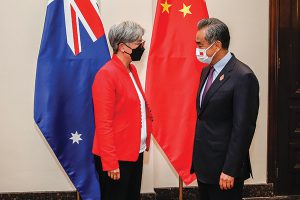Bloomberg
Group of 20 finance chiefs started official meetings in Bali Friday with an eye towards progress on food security and debt issues as tensions over Russia impeded prospects for a more sweeping agreement.
Host Indonesia is pushing for G-20 members to pledge more concrete action to respond to food insecurity, including by sharing data on commodity stockpiles, and for them to coordinate better on macroeconomic policies, according to a person familiar with the discussions.
Against the backdrop of increasingly desperate moves this week by officials to stamp out inflation in off-cycle adjustments and jumbo interest-rate increases, the finance ministers and central bank governors scrambled to find areas of cooperation amid a growing list of risks to global economic stability.
The G-20 discussions have been “very difficult but sometimes fruitful,†Sri Mulyani Indrawati, Indonesia’s finance minister, said in opening remarks for the Friday meetings. “Despite all our differing positions, we have been able to make tangible progress on some critical issues.â€
Indrawati cited “an alarming increase in risks to food security†wrought by the war in Ukraine and its after-effects, on top of pandemic woes. “The war as well as the commodity-price increase could worsen the global inflation spike and increase further social instability.â€
US Treasury Secretary Janet Yellen on Friday again laid the blame for commodity-price inflation and food security woes squarely with Russian officials, who she pinned for “horrific consequences†and an “ongoing human and economic toll.â€
Russia’s destruction of agricultural facilities, theft of farm equipment, and blockade of ports have amounted to using “food as a weapon of war,†Yellen said at an afternoon seminar on food security.
She and other officials including Indrawati and Saudi Arabia Finance Minister Mohammed Abdullah Al-Jadaan urged G-20 action to alleviate the crisis, especially in lower-income countries— pitching solutions such as identifying and distributing from rare pockets of fertilizer supply in order to bring down costs and to avoid triggering associated inflation for staples like rice.
About 14% of world’s food is lost between harvest and retail and an additional 17% is wasted at the retail to customer level, Al-Jadaan said, adding that reducing food loss and waste “can go a long way†in supporting food security and also alleviate industrial pollution.
Calling on the international community to boost and accelerate aid to Ukraine, Yellen earlier on Friday said the war made it even more important for officials to come together on global challenges including tighter financial conditions and slowing growth in major economies.
The message was underscored Friday by unexpectedly weak data from the world’s No. 2 economy. China expanded in the second quarter at the slowest pace since the start of 2020 when Covid initially befell Wuhan.
Later Friday, Yellen urged emerging-market countries to consult with the International Monetary Fund when considering capital controls and currency interventions, even as she expressed sympathy for nations wrestling with volatile capital flows.
A flurry of central bank decisions this week, some unscheduled, have accentuated officials’ need to keep their own domestic conditions at the forefront.
At the same time, the G-20 meetings are increasingly stressing the dangers of ignoring instability in the more vulnerable pockets of the global economy, including countries that are teetering on the brink of sovereign default — or already there, like Sri Lanka.
 The Gulf Time Newspaper One of the finest business newspapers in the UAE brought to you by our professional writers and editors.
The Gulf Time Newspaper One of the finest business newspapers in the UAE brought to you by our professional writers and editors.
